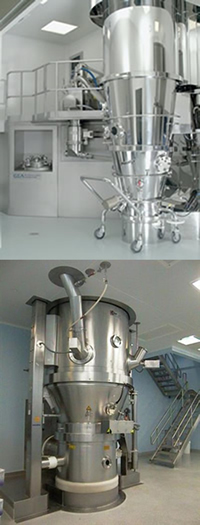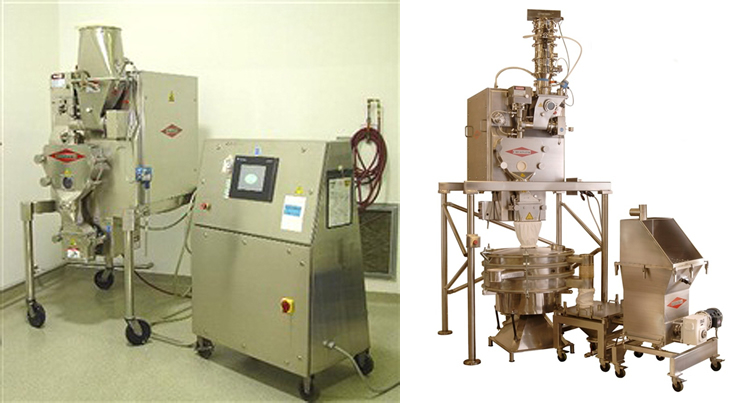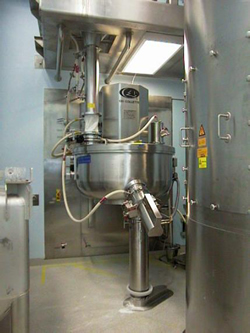

 Granulation
GranulationOur large capacity fluid bed dryers are used to produce a wide range of granulated materials. Liquids are introduced into the chamber with a spray system while the product is being moved by heated air to create the granulation. When the product has been dried to the required moisture level it is milled and screened to collect the desired mesh size. What are fluid bed dryers? Fluid bed dryers are designed to dry powder particles, where the residual moisture content is higher than what is wanted in the final powder. Hot drying air is distributed through specially designed perforated plates, on which the powder particles/agglomerates are resting.
The velocity of the drying air makes the powder ‘fluidize’, i.e. the particles get airborne; however, to the extent that only the finest/smallest particles leave the fluid bed with the air, while the bigger particles/agglomerates are conveyed/ transported with the upward and forward directed flow of air (due to the perforation technique of the plate) into the subsequent section. Here cold and/or dehumidified air is introduced to cool the powder to the wanted temperature. Fluid bed drying is suited for powders, granules, agglomerates and pellets with an average particle size between 50 microns and 5 mm.
USA Pharmaceuticals & Sports Science has fluid bed capabilities and have just installed a state-of-the art Integrated PMA Pharma Matrix Mixer / Granulator and MP Multi-Processor fluid bed Processor. The Multi-Processor™ has been developed to meet the pharmaceutical industry's requirements for process flexibility. MP - The Multi-Processor™ is based on the principle that one basic unit can be used for numerous processes simply by interchanging a module. Capable of performing any Fluid Bed Process, the MP-5 features a diverse range of options including high efficiency drying, top spray granulation, bottom spray pellet coating (Precision Coater™) and side spray granulation / coating (FlexStream™). With a batch range from as little as 30kg, up to 100kg, the MP-5 complements the GPS granulation and pelletization equipment, but still maintains the flexibility offered by a mobile design.
Granulation - Chilsonation
USA Pharmaceuticals & Sports Science offers Chilsonation systems that are used to create granulated products when no liquid can be added to the raw material. Raw material is passed between high-pressure rollers to form a sheet of material that is processed through a Fitzpatrick Mill that grinds the product into a granular form. The ground material is then screened to collect the desired mesh size.

Dry Granulation Capabilities
USA Pharmaceuticals & Sports Science has 3 processing rooms for dry granulation, both of which are dedicated to food and nutritional products. Each independent room has its own air, water, ventilation, and dust collection system to reduce the possibilities of cross contamination. USA Pharmaceuticals & Sports Science has one Fitzpatrick IR-520 Chilsonator; one Fitzpatrick L-89 Chilsonator; and one L-83 Chilsonator. All equipment has stainless steel contact parts. We have extensive experience dry granulating Pharmaceuticals, various sports supplements, weight loss ingredients, herbal extracts, and hydroscopic or low-melting point ingredients.
 Why Dry Granulation?
Why Dry Granulation?
To create a desired particle size. Through dry granulation, you can take a powder, increase the particle size, and control the distribution of the particle size.
For blending similar products. Often times, our customers need to blend different materials that vary in particle size. By matching particle sizes, they can achieve a uniform blend. To improve product flow. Powders tend to tunnel and cake. A granular product allows your product to flow freely through your production process.
To increase/decrease bulk density. By controlling the bulk density, you can control the flow and metering ability of a product.
To control particle hardness. Particle hardness can affect the dissolution and dispersion rates of a product. Also, the hardness of a particle helps to limit the disintegration of the product. By varying the pressure of the rolls in the chilsonator, we can improve the performance of a product.
To reduce dust. A dusty work environment is not only a nuisance but can pose a serious health and explosion risk. A granular product significantly reduces dusting.
Cost. Dry granulation is a much cheaper process than wet granulation.